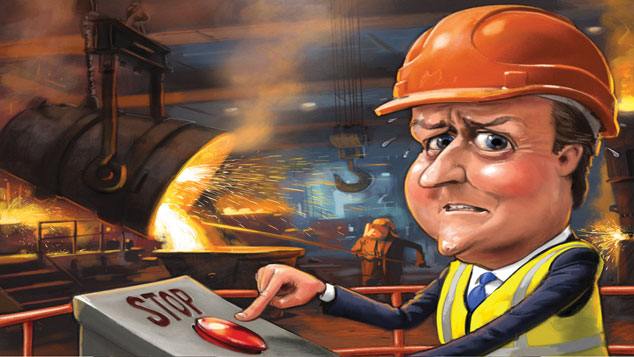British steel: a rake’s progress to ruin
The threat of Tata closing all of its steel plants in Britain has led to soul-searching about the fate of British manufacturing. Matthew Partridge reports.

Get the latest financial news, insights and expert analysis from our award-winning MoneyWeek team, to help you understand what really matters when it comes to your finances.
You are now subscribed
Your newsletter sign-up was successful
Want to add more newsletters?

Twice daily
MoneyWeek
Get the latest financial news, insights and expert analysis from our award-winning MoneyWeek team, to help you understand what really matters when it comes to your finances.

Four times a week
Look After My Bills
Sign up to our free money-saving newsletter, filled with the latest news and expert advice to help you find the best tips and deals for managing your bills. Start saving today!

The possibility that Tata could close all of its steel plants in Britain, costing an estimated 40,000 jobs, has led to soul-searching about the fate of British manufacturing.
"This is just the latest episode in what is now a depressingly familiar saga," says Bryan Gould in The Guardian. "No other major developed country attempts to maintain its developed status with such a low contribution from manufacturing."
This has big implications for our economy: "we have run a perennial trade deficit... since 1982", forcing us into a "rake's progress" of borrowing and asset sales.
MoneyWeek
Subscribe to MoneyWeek today and get your first six magazine issues absolutely FREE

Sign up to Money Morning
Don't miss the latest investment and personal finances news, market analysis, plus money-saving tips with our free twice-daily newsletter
Don't miss the latest investment and personal finances news, market analysis, plus money-saving tips with our free twice-daily newsletter
"Advanced manufacturing is a high-value activity that helps to drive skills, productivity and technological expertise," agrees Brian Groom in the Financial Times. "If the government can work with industrial sectors to meet their training needs, build supply chains and develop emerging technologies, that should be a help."
But we need to be realistic. "Arresting the decline of UK manufacturing at about 10% of economic output", let alone raising it to the 30% share last seen in the early 1970s, "would be an achievement". Quick-fix solutions, such as government ownership, "would surely be futile".
Another firm may be persuaded to take the plants over. However, potential buyers want steep cuts in carbon taxes. Little wonder, says The Spectator. The government has "made sure that our manufacturers feel the force of green levies, unlike Germany, which exempts its own industry".
As a result, Tata's energy costs "are 25% more than they would be in Germany and 50% more than they would be in France". This is pointless. If manufacturing simply moves abroad, that "won't do a thing to reduce global carbon emissions". The government must end this "industrial suicide" and "reduce carbon taxes and levies for everyone".
The whole debacle highlights the fact that "we no longer call the shots, even when thousands of jobs are at stake", says Boris Johnson in The Daily Telegraph, due to "the objections of Brussels to anything that looks like state aid". We can't even impose tariffs on cheap Chinese steel "because we have given up control". It's not Europe's fault, says Michael White in The Guardian.
"All EU steelmakers face challenges from cheap Chinese steel... but other countries and their industries are faster footed at responding." For example, "French people buy French without being told" to. However, it's true that "Ed Miliband's 2008 Climate Change Act" (backed by the Tories at the time) "was a pricing gift to rival steelmakers".
We can't have it both ways, writes Hugo Rifkind in The Times. "When we talk about the environment, either we mean it or we don't." Rather than "worrying about the dying steel industry" we "should have worried long ago about our nascent wind turbine industry". Even in "gas-guzzling" America, more people now work in solar than in oil and gas. Just a little investment could help us become a country "that builds turbines and sells them back to China and Brazil".
Get the latest financial news, insights and expert analysis from our award-winning MoneyWeek team, to help you understand what really matters when it comes to your finances.

-
 Should you buy an active ETF?
Should you buy an active ETF?ETFs are often mischaracterised as passive products, but they can be a convenient way to add active management to your portfolio
-
 Power up your pension before 5 April – easy ways to save before the tax year end
Power up your pension before 5 April – easy ways to save before the tax year endWith the end of the tax year looming, pension savers currently have a window to review and maximise what’s going into their retirement funds – we look at how